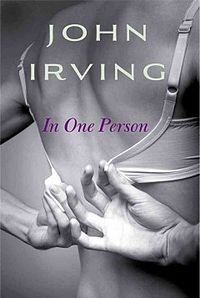Review by Dan Geddes
Note: The first part of this review is for would-be readers and thus contains no spoilers. The second part is further commentary, including spoilers.
John Irving would admit that sexual orientation is still an important political issue in America, but he probably wishes it wasn’t. His recent novel, In One Person, attempts to further normalize gay, bisexual and transgender people for his massive audience, extending a lifelong effort, going back at least to The World According to Garp and A Son of the Circus.
In One Person is an enjoyable fifty-year chronicle about a bisexual writer from Vermont, from his illegitimate birth in the 1940s to the present day. Bill Abbott’s life echoes larger changes in American society’s attitude toward gays, from the bigoted intolerance in the early 1960s, to the wild promiscuity of the 1970s, the tragedy of the AIDS crisis in the 1980s, and eventually the slow legitimization of gay life and the progress of more institutional tolerance in the 21st century, despite continuing homophobia in America, especially over the issue of gay marriage.
Irving clearly has a “political” purpose in In One Person: he is humanizing and normalizing gay life for his readers, most of who are probably supportive of gay rights, but may actually have had relatively little exposure to gay life or practices. The book is a salvo against intolerance, especially homophobia.
In One Person contains a lot of information about gay culture, especially sexual terminology and even techniques; Irving, it seems, has done some research. Despite his success in normalizing gay life, Irving characters’ fixation on sex is unlikely to convert many homophobes to tolerance. He is preaching to the choir. Bill Abbott is a likeable enough protagonist, but his very promiscuity makes him an unsavory character for homophobes.
Irving creates a town called First Sister, Vermont, which despite its conventional New England exterior, turns out to contain a surprising large troupe of gay, bi, trans-gender or cross-dressing individuals.
First Sister also somehow manages to support two theater companies, a local one and the prep school’s theater group. Bill Abbott’s grandfather, Harry, nearly always lands the lead female part in the plays. This is seemingly accepted as normal by most of the townsfolk, especially as Harry is a successful lumber mill owner. The First Sister players often put on Shakespeare’s plays, which in Shakespeare’s time always featured men playing the female leads. Irving describes many of the plays at length (King Lear, Othello, The Tempest, Romeo and Juliet), using them as vehicles for exploring sexual mores and his other themes.
First Sister also has its share of homophobic bigots, including Bill’s mother, Mary, and Aunt Muriel. They are intolerant of the most notorious transsexual in town (who isn’t overtly revealed at first), as well as Grandpa Harry’s enthusiastic performance in so many female roles. They are worried about young Billy’s proclivities early on.
Irving does his usual good job of creating a sense of family and (New England) community. Much of the enjoyment of the book comes from spending time with characters who know each other so well, and maintain their family and community ties despite sharp disagreements over things such as gender issues. Interestingly, the bigoted members of Billy’s family are homophobic without any religious underpinning. The Marshalls, Abbotts and their extended family don’t go to the church at all, and Billy later writes that he was at least spared the lie of religion. So the family homophobia springs more from sheer conventionality than any Biblical or religious arguments against homosexuality (unlike in contemporary America, where much homophobia is based on the argument that homosexuality is a sin).
Irving’s large base of readers is likely to be satisfied by In One Person. It has many of the familiar features of a John Irving novel: a lively depiction of a small New England community, a funny first-person narrator; and an inordinate number of homosexual, bisexual or transgender characters—who are individuals first and so defy efforts to label or stereotype them.
In addition to Vermont, some of the action takes place in other familiar Irving haunts, such as Vienna and New York. Irving here creates his usual sense of cosmic coziness, of characters who are smart, funny and know each other so well that we feel we like them too. We grow to like almost all of them (except the bigots, of course).
I have to quote Thomas Mallon in The New Yorker on In One Person: “The author’s stylistic virility has always depended on performance-enhancing devices that literary fiction tried to outlaw years ago—big-hearted, Dickensian contrivances—and, at seventy, he is waving a rainbow flag on this latest trip over the top.”
In One Person – Further Commentary
In One Person depicts a world full of sexual desire and constant meditations thereon. Young Billy Abbott has “crushes” on boys and girls and men and women equally. He eventually realizes he is bi-sexual, which makes him a “sexual suspect” (to borrow a phrase from The World According to Garp): heterosexuals see him as gay; gay people see him as hedging his bets, keeping “one foot in the closet.”
As Billy grows into adulthood, living in Vienna and then in New York, he indulges his sexual appetites. He shows little or no emotional scarring from his upbringing in somewhat prudish small-town Vermont, where he was the subject of a sexual scandal. Billy had “improper” relations with Miss Frost, whom he finally learns is a transsexual. The tall, muscular Miss Frost used to be “Big Al” Frost, the captain of prep school’s wrestling team (with an unbeaten record). After they are caught in flagrante delicto, Miss Frost loses her job at the library and Billy is ordered not to engage in any contact with her for the rest of his senior year.
As a teenager, Billy also fooled around a bit with Elaine, a thin girl with small breasts (it is repeated), who eventually becomes Billy’s best lifelong friend. Billy and Elaine share the belief that traditional marriage is a highly flawed institution that they strongly prefer to avoid.
Elaine is seduced by the handsome, charismatic bully, Kittridge, a sarcastic wrestler whom Billy also develops an unwanted crush on. Kittridge is the most attractive boy in school, and yet has a mysterious antagonism toward his mother, and is the only boy in the athletic dorm to get his own room. Mrs. Kettridge solves the problem of Elaine’s pregnancy by taking her to Europe for an abortion, where the beautiful, austere Mrs. Kittridge makes a lifelong impression on her.
Billy also discovers that Tom Atkins, a sensitive boy, has a crush on him. They decide to spend a summer in Europe traveling together. Billy ends up reading all of Flaubert’s Madame Bovary to Atkins aloud. Madame Bovary is a key text for In One Person. Both Miss Frost and Richard had warned Billy that he shouldn’t read it as a fifteen year old, but first had to experience a broken heart before he could appreciate it. Tom Atkins is jealous of Billy’s interest in the book, almost as if the book were a sexual rival, and so insists that Billy read it aloud to him. They learn from Madame Bovary that conventional monogamy is an unhappy prison for most, and if a person is bored with married life, they have an obligation to themselves to seek some solace, even if outside the marriage. Or better yet: never get married at all!
Since Billy shares so many major biographical details with John Irving, it’s hard not to see Billy as Irving’s stand-in in the novel. Irving has stated that he’s not bisexual himself, but was attracted to some other male wrestlers while in his teens.
Gender-bending has always been one of Irving’s main themes, but in In One Person this is the main theme. There is less violence, rape or dismemberment than in many Irving productions, but we still get a car crash that kills the bigots Mary (his mother) and Muriel, which hardly even seems to phase Billy. He’s still thinking more about Miss Frost at the time. Billy’s lack of love for his mother as he grows older is one of his least sympathetic qualities.
In One Person sometimes reads like a gay parable, in which the homophobes die violent deaths. It even uses the time-honored convention where the most menacing homophobe (Kittridge) of all turns out to be a transsexual himself, thereby further vindicating Billy and Tom. He remains a mythical figure to Billy, Elaine, Tom and others, but despite all the build-up Billy and Elaine never find Kittridge himself; they only hear from Tom on his deathbed that Kittridge is one of them, that he has become a beautiful woman in Zürich. It is not clear why we are denied seeing Kittridge in old age. At the end, when Kittridge’s son confronts old Bill Abbot about Kittridge’s past, I was terrified that a gun would be pulled out (as at the end of Garp) and that a bloodbath would ensue.
Overall, In One Person is a satisfying chronicle. Irving carefully works in some flash-forwards to Billy’s adult life in order to pique interest in other subplots. We know the AIDS epidemic is coming and that it will devastate some of the characters. Irving handles these scenes with consummate skill.
Irving succeeds in “normalizing” his many LGBT characters and makes them human beings first and foremost. He shows that there are so many gradations in human sexuality that it seems inhuman and intolerant to hate other people only for whom they are sexually attracted to.
Dan Geddes
30 August 2012









Be First to Comment